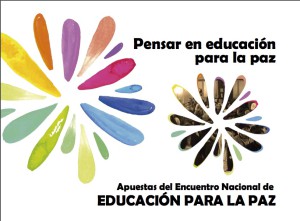FREE FLOW OF INFORMATION
Presentation of the final report
Thinking about Education for Peace is the fruit of the National Conference on Education for Peace, held in Colombia on 1 and 2 October 2015. In this gathering there emerged ways of building and living life, led by youth, women, men weaving their daily lives amid resilient and creative practices that challenge and redefine the imaginary and cultural references that have sustained various types of violence.

The National Meeting on Education for Peace, was undertaken with the following objectives: 1) to articulate experiences and facilitate exchange of knowledge on education for peace among different actors and sectors of society from the perspectives of education for peace and building cultures of peace; 2) Generate a reflection with a broad spectrum on the challenges that the current situation presents to education for peace, in both social organizations and educational institutions at all levels, and 3 ) Promote a consensus to generate public policies in education for peace.
We have considered it essential to collect the experience of the National Meeting on Education for Peace. Therefore, we set out to investigate the question: What is the agenda of peace education that was proposed at the national meeting? Of course it is ambitious goal to record all the wealth, conversations, practices, concerns, desires and diversity of this meeting. However, this report, Thinking about Peace Education, aims to highlight the main commitments emerging from the many conversations that took place on 1 and 2 October at the National Meeting on Education for Peace. Therefore, we have structured this publication as follows:
(Article continued in right column)
(Click here for the original Spanish of this aricle.)
What is happening in Colombia, Is peace possible?
(Article continued from left column)
CROSSROADS, to account for the genesis of this meeting and its coordinates in the processes of peace building, which for more than two decades have been promoting different actors in Colombia, in the context of education for peace, from the convergence of diverse, new synergies, dynamics and actors scenarios evidence.
METHOD, to account for the methodological proposal for the meeting, which involved 652 assistants, from twenty departments, representatives of two hundred eighty organizations that take actions for peace education.
COMMITMENTS for peace education, to account for the hopes and commitments that emerged at the National Meeting on Education for Peace, from a reading exercise of the conversations were in the meeting and can guide actions and processes different scenarios.
SOME PROPOSALS to account for proposals for concrete actions that emerged in several of the workshops. The actions are grouped into several areas: social mobilization, generation and strengthening of public policy, university chairs for peace, human rights education and administrative and institutional framework.
OTHER PERSPECTIVES, to account for reflections and perspectives by the foreign and domestic guests at the National Meeting on Education for Peace: The professors Alicia Cabezudo, Rosa Ludy Arias Campos, Marina Caireta Sampero, Janet Gerson, David Adams, and Carlos Eduardo Martinez Hincapie, wanted to bring some elements from what they felt and observed in relation to their own experiences and studies on education for peace.
This publication was edited by a group of people from several of the founding organizations of the National Conference on Education for Peace, who collected the agreements and proposals from the table convenors in order to guide the methodological and systematic processes.
We hope this publication Thinking about Peace Education will be a contribution to building cultures of peace in Colombia, as an effort to contribute to the many initiatives and processes that are interwoven in the search for a country reconciled and peaceful.